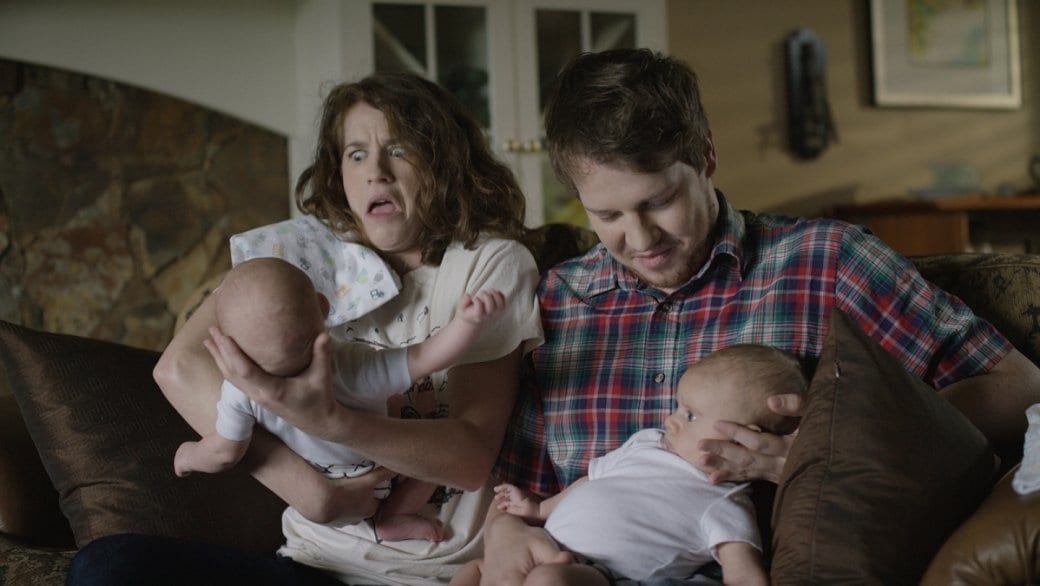Don’t let its seemingly straight promo shot fool you. If at first glance the new web series Inconceivable seems tired, it’s only because its extremely gay content isn’t immediately apparent.
But it’s there. It just takes a little patience to understand exactly where this show’s characters sit on the Kinsey scale.
Or not so much patience. Within the first few minutes of the pilot episode, Rita, a young, lesbian artist living in Vancouver, has explained her experiment with a straight dude, their broken vegan condom, a failed morning-after pill and the unexpected pregnancy she now faces.
Still, I was skeptical.
Rita compares her experimentation with men to the exploits of a college-aged straight girl exploring her sexuality with women. By reversing the standard college-girl-experimenting stereotype, the show risks over-simplifying the experience of fluid lesbian sexuality and dismissing the scrutiny that lesbians regularly face when their sexuality is called into question.
Feeling uneasy, and expecting offensive stereotypes and failed attempts at representing queer culture, I instead found a tightly-written show and in-depth characters with a diversity of sexual desires.
The pilot episode of Inconceivable.
Telus Optik Local/Youtube
No wonder the pilot episode won one of two top prizes a few months ago in the web series category at Telus’ Storyhive.
The award earned Inconceivable’s creators, Rachel Kirkpatrick and Joel McCarthy, $50,000 — enough to (just barely) cover the cost of creating five more 10-minute episodes. Once they have Season One in hand, they hope the show will get picked up by a network.
Kirkpatrick and McCarthy are key to the show’s realness. The plot is mostly based on their lives and the unexpected pregnancy they recently faced when Kirkpatrick (a lesbian artist) got knocked up by McCarthy (a straight cis man and filmmaker).
In real life, Kirkpatrick just gave birth to the baby referenced in the pilot episode. When Daily Xtra interviewed her by phone, the newborn could be heard cooing in the background.
So far parenthood is awesome, she says. “I really like it, I just get to hang out with a baby.”
Kirkpatrick tells Xtra she and McCarthy are living together at McCarthy’s parents’ house. In true Vancouver style, the apartment they had lined up, before having the baby, fell through.
The two met by chance at a bar after one of McCarthy’s films was screened at the Rio Theatre. They hooked up that night.
Kirkpatrick maintains that she told McCarthy she was a lesbian when they first made out at the bar. But McCarthy says he didn’t find out until the next morning over breakfast.
Reached by phone, a sleep-deprived McCarthy remembers the moment he learned that Kirkpatrick isn’t prone to dating men.
“She told me, ‘this never happens to me,’ and I said, ‘me neither,’ and then she said, ‘no, you don’t understand, I’m gay.”
They began dating, and McCarthy was warmly received in Kirkpatrick’s lesbian circles. Kirkpatrick says her sexuality is defined by her preference towards women, rather than who she’s dating at a given time.

“I consider myself a fairly masculine person and in a lot of ways I see Joel as a fairly feminine person . . . [it] felt like a queer relationship,” she says. “He fit in really well with people I was with and around . . . he came to lesbian parties where he was the only male there.”
As acceptance of diverse gender and sexual orientations grows, Kirkpatrick and McCarthy’s series shines a light on what it’s like for a lesbian to wind up in a seemingly hetero-normative co-parenting situation.
“On the one hand it seems very hetero,” says Kirkpatrick, adding that she sometimes catches herself wondering, “how did I get here?”
Since going public about their relationship during a radio interview, Kirkpatrick has received backlash over her lesbian identity from a few members of the public. But she has thick skin and laughed it off, she says.
“I just think it’s funny. People like to label other people and it’s not really up to them ever.”
“Even while I was dating him, I still identify as a lesbian,” she says. “I don’t think that it will ever change because to me I see it as [more about] a preference . . . than it is necessarily about your behaviour.”
How they label their relationship constantly changes, the pair notes. They wouldn’t disclose whether they’re still romantically involved.
“Let’s just say a lot can happen in nine months,” Kirkpatrick says.
One potential hint: if they get funding for a second season, they will explore issues around polyamory and non-monogamy, a mostly unexplored topic in TV.
“We’re gonna be a fairly open-minded family no matter what,” Kirkpatrick says, “because of how we started but also because of the generation we’ve grown up in.”

 Why you can trust Xtra
Why you can trust Xtra


